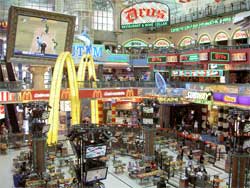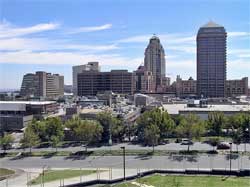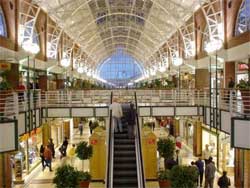South Africa is a nation of shoppers but it's failing to fuel sustainable growth in the country where more fixed investment and job creation are needed to foster real growth.

Canal Walk in Cape Town. Image: Wiki Images
That was the message from Stanlib chief economist Kevin Lings last week at the annual Hospital Association of South Africa (Hasa) conference in Cape Town.
He said the growth in South Africa since the global recession had been driven by increases in government salaries and the wage bill, which doubled over the past five years. This equated to an average annual increase of 15% a year.
These increases were spent buying imported goods so, although South Africa was a nation of shoppers, it was producing very few of the goods people were buying.
"Since the recession ended, shopping explains 92% of South Africa's growth," said Lings. "When we go shopping we make the Chinese happy. The economy should be creating jobs out of manufacturing, which would feed into other industries, but at the moment we shop and don't buy local products," he added.
The manufacturing sector has shrunk from about a quarter of GDP in 1990 to about 11% today and the country is running its biggest trade deficit yet.
Shop till you drop is SA's way
"What this tells you is we can't shop our way to success. Whatever we're buying we don't produce locally. We're simply exporting our income, our taxes. We're working for China. That's not the way to grow the economy. We need to build more and shop less," he said.

Jo'burg's shopping hub at Sandton City. Image: Wiki Images
He said a larger middle class was needed and the country had to increase its spending on fixed investments from 19% of GDP to about 25% and keep it there for at least 10 years.
Ling said that people are trying to get around any of their financial problems by taking out more loans.
"In South Africa, when our income goes down, we speak to Capitec or African Bank. We are growing unsecured credit at 40% a year in the form of personal loans. At some point last year Capitec was processing 5,000 loans an hour and eventually Abil and Capitec worked out that households can't afford it.
Loans becoming unaffordable
"At Capitec the minimum interest rate is about 17%. The highest interest rate when you're not a favourable client is about 26%. That's just the start of it. Then there are administration fees, and cover for insurance; it's starting to hurt," he said.
Lings was addressing the conference on how South Africa could grow its participation in medical schemes to 30%, and pointed out that South Africa needed to increase its middle class so more people are able to afford medical cover.
He said that the country had certain aspects in its favour with government debt, at 40%, was lower than the international guideline of 60%.
The number of tourists visiting South Africa was increasing and they are spending more than they did during the 2010 World Cup.
"It turns out soccer fans don't have money. Now we have more people with money. Many of them are from Africa, who are visiting the country," he said.
Foreign investment in South African bonds and equities was almost US$100bn and foreigners owned about 35% of the stock market and a similar percentage of the bond market.
Strong foreign investment
He said there was more money coming into South Africa than leaving it and because South Africa was able to attract persistent capital inflow, it had an advantage.
One of the stumbling blocks to growth was that the government needed to open up infrastructure bottlenecks and spur the corporate sector into unlocking their balance sheets. Moreover, companies were sitting on large cash reserves.
Lings went on to say that employment was the key goal because when a job is created it changes the circumstances of the people employed. "You create a job, you change those circumstances. So first create the jobs, then the social support," he said.
Barry Childs, chief executive of Lighthouse Actuarial Consulting said increasing medical cover would relieve the public healthcare sector. He outlined various ways for the private healthcare sector to increase its coverage by making it more affordable to belong to a medical scheme.
"Medical scheme regulatory reform, which had been proposed years ago, was critical to making medical cover more affordable," he said.
"It's not that it's broken, but it's not complete," said Childs. "While national health insurance is important, we can't leave medical schemes as a regulatory orphan in the meantime."
A risk equalisation fund would create a level playing field between schemes to even out the financial effect of different risk and demographic profiles. He said that regulations that made it mandatory for all those in formal employment to belong to a medical scheme should be introduced.
Source: Business Times via I-Net Bridge





















































